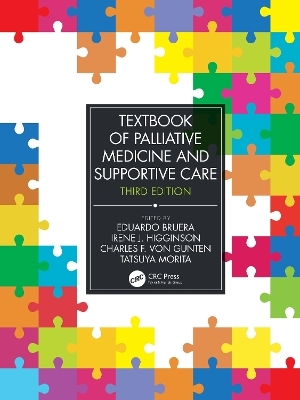
Textbook of Palliative Medicine and Supportive Care
CRC Press (Verlag)
978-0-367-64203-7 (ISBN)
Eduardo Bruera, MD, FAAHPM is Professor and Chair, Department of Palliative, Rehabilitation and Integrative Medicine, The University of Texas MD Anderson Cancer Center, Houston, Texas, USA Irene J. Higginson, OBE, BMedSci, BMBS, PhD, FMedSci, FRCP, FFPHM is Professor and Director, Cicely Saunders Institute of Palliative Care, Policy and Rehabilitation, King's College London, UK Charles F. von Gunten, MD, PhD is Vice President, Medical Affairs, Hospice and Palliative Medicine, OhioHealth, Columbus, Ohio, USA Tatsuya Morita, MD is Director, Department of Palliative and Supportive Care, Seirei Mikatahara General Hospital, Hamamatsu, and Adjunct Professor, Kyoto University, Japan
List of contributors. The development of hospice and palliative care. Palliative care as a public health issue. Palliative care as a primary care issue. The future of palliative medicine. Palliative care and supportive care. Ethics in the practice of palliative care. Undergraduate education in palliative medicine. Graduate education for nonspecialists. Challenges of research in palliative and supportive medicine. The population: Who are the subjects in palliative medicine research?. Study designs in palliative medicine. Outcome measurement in palliative care. Ethics in palliative care research. Adoption of palliative care: The engineering of organizational change. Principles of measuring the financial outcomes of specialist palliative care programs. Population-based needs assessment for patients and those important to them, such as families. Models of palliative care delivery. Home palliative care. Palliative care unit. Multidimensional patient assessment. Tools for pain and symptom assessment. Quality of life assessment in palliative care. Pathophysiology of chronic pain. Causes and mechanisms of pain in palliative care patients. Opioid analgesics. Assessment and management of opioid side effects. Adjuvant analgesic medications. Alternative routes for systemic opioid delivery. Interventional pain procedures in palliative care. Pain management in pediatrics. Pain in the older adult. Neuropathic pain. Bone cancer pain and skeletal complications. Breakthrough (episodic) pain in cancer patients. Somatic symptoms, symptom clusters, and symptom burden. Pain in patients with alcohol and drug dependence. Cachexia–anorexia syndrome. Nausea/vomiting. Constipation. Jaundice. Malignant bowel obstruction. Endoscopic treatment of digestive symptoms. Mechanism, assessment, and management of fatigue. Breathlessness. Other respiratory symptoms (cough, hiccup, and secretions). Depression/anxiety. Delirium. Sleep disturbances in advanced cancer patients. Counseling in palliative care. Hope in end-of-life care. Dehydration and rehydration. Fever, sweats, and hot flashes. Pruritus. Infections in palliative care. Pediatric palliative wound care: The unique anatomy and physiology of neonatal skin. Mouth care. Fistulas. Assessment and management of lymphedema. Hypercalcemia. Hemorrhage. Spinal cord compression. Clinical features and management of superior vena cava syndrome. Acute pain and management. Suicide. Cancer: Radiotherapy. Chemotherapy, hormonal therapy, targeted agents, and immunotherapy. Integrative medicine in supportive and palliative care. Neurological diseases. End-stage congestive heart failure. Geriatric palliative care. Advanced chronic obstructive pulmonary disease. Other infectious diseases: Malaria, rabies, tuberculosis. Practical resources for palliative care development in countries with limited resources: An IAHPC perspective. Prognostic indicators of survival. Palliative sedation. Staff stress and burnout in palliative care. Spiritual care. Family caregivers and cultural sensitivity. Bereavement. Children of palliative care patients. Neutropenic fever. Side effects of radiation therapy. Cardiac and pulmonary toxicities of treatments. Oral complications of cancer therapies. Dermatologic side effects. Peripheral neuropathy and neurotoxicity. Sex and sexuality. Managing communication challenges with patients and families. Supportive and palliative care for patients with HIV infection. Implantable cardiac devices. Supportive care for patients with advanced chronic kidney disease. Palliative care in the emergency department. Optimal Symptom Management in Hematopoietic Stem Cell Transplantation. The end of therapy: Building the psychosocial and spiritual bridges to survivorship. Rehabilitation in the acute and chronic care setting. Long-term cognitive function. Gonadal functions and reproductive health. Pulmonary rehabilitation. Index.
| Erscheinungsdatum | 19.07.2021 |
|---|---|
| Zusatzinfo | 207 Tables, black and white; 20 Line drawings, color; 66 Line drawings, black and white; 9 Halftones, color; 6 Halftones, black and white; 29 Illustrations, color; 72 Illustrations, black and white |
| Verlagsort | London |
| Sprache | englisch |
| Maße | 210 x 280 mm |
| Gewicht | 3060 g |
| Themenwelt | Medizin / Pharmazie ► Allgemeines / Lexika |
| Medizin / Pharmazie ► Medizinische Fachgebiete ► Medizinethik | |
| Medizin / Pharmazie ► Medizinische Fachgebiete ► Palliativmedizin | |
| Medizin / Pharmazie ► Medizinische Fachgebiete ► Schmerztherapie | |
| Studium ► Querschnittsbereiche ► Geschichte / Ethik der Medizin | |
| ISBN-10 | 0-367-64203-4 / 0367642034 |
| ISBN-13 | 978-0-367-64203-7 / 9780367642037 |
| Zustand | Neuware |
| Informationen gemäß Produktsicherheitsverordnung (GPSR) | |
| Haben Sie eine Frage zum Produkt? |
aus dem Bereich


